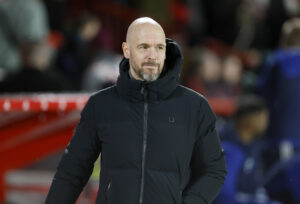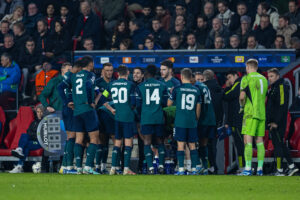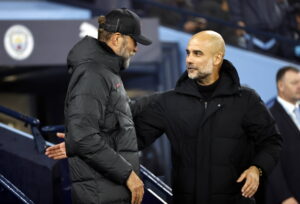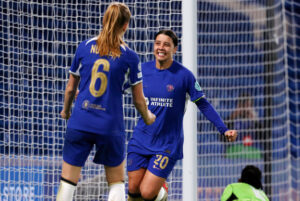In one sense, David Dein does not belong on this list, as he was neither a manager nor a player, and yet it would be absurd to exclude him from any list of Arsenal’s greatest ever figures, such was his contribution to the Gunners. He was arguably the most important director or administrator in the history of the club, who was almost single-handedly responsible for the appointment of Arsène Wenger as manager, and it was his departure from Arsenal in 2007 that perhaps signalled the start of Wenger’s long, slow decline as a manager. In short, Dein was the kingmaker and, without him, the king who he appointed was never quite as effective as when Dein was the power behind the throne.
The Managers, Players and Matches That Made Arsenal. No. 4 – David Dein
A Lifelong Arsenal Fan
David Dein’s devotion to Arsenal (at least until he left the club) was so complete that little or nothing is known about this extremely private man other than his involvement with the club and his wider role in English football as a whole. He was born in London in 1943 and became a successful businessman, specialising in the importing and exporting of goods. Then, at the age of 40, he was finally given the opportunity to convert his long-standing emotional attachment to Arsenal, having been a lifelong supporter of the club, into an actual financial investment.
It says everything about the relative financial undervaluing of English football in general in the 1980s and of Arsenal in particular (the Gunners having won only the 1979 FA Cup in the dozen years since the 1971 Double) that in 1983 Dein was able to buy a substantial share—over 16%—for just under £300,000 and immediately became vice-chairman. Famously, Arsenal’s chairman at the time, Peter Hill-Wood, whose family had owned the club since his grandfather had bought it in 1929 and launched it on its Golden 1930s, told Dein that his investment was “crazy” and that he would see little or no return from it. However, Dein, who was a shrewd businessman rather than a seemingly self-satisfied Old Etonian like Hill-Wood, recognised the enormous financial potential of football and set about realising it.
The Appointment of George Graham
For the first three years that Dein was involved at Arsenal, little progress was made on or off the field, as the club continued the long period of stagnation that had set in at the end of the 1970s. That stagnation had convinced its greatest player of the period, Liam Brady, that he had no realistic opportunity of winning major silverware at Arsenal, especially when Liverpool were so dominant in both English and European football, and so he left for Italy and Juventus instead. However, the first of the two great managerial appointments made on Dein’s watch came in the summer of 1986. That was when George Graham, a former Arsenal player and indeed a hero of the 1971 Double-winning side (Graham always claimed that he had got the last touch on the equaliser against Liverpool in the 1971 cup final), was appointed manager.
The appointment of Graham was a bold move at the time and now, more than three decades on, it seems almost inconceivable. Graham had never even managed in England’s top flight – the old Division One as it was called, before the introduction of the Premier League in 1992, which Dein would prove to be so instrumental in creating. Instead, he had led unfashionable, even maligned Millwall to promotion from the old Third Division and to relative stability in the Second Division. Nevertheless, Dein and the rest of the Arsenal board took a chance on the Scot that ultimately paid off in spades. Within three years, Graham had created a genuinely great Arsenal side, one capable of defeating the mighty Liverpool 2-0 at their own home ground, which remains the greatest result in Arsenal’s history, and they became champions of England.
That incredible early momentum under Graham was maintained for several more years, as Arsenal were crowned champions again in 1991, achieved a domestic cup double in 1993 and won the Cup Winners’ Cup (only the second European success in the entire history of the club) in 1994. And just as Graham’s team were achieving great success on the pitch, Dein and his own team of behind-the-scenes administrators and financiers were achieving great things off the pitch. First of all, Dein was the main man behind the successful redevelopment of Highbury in the wake of the Hillsborough disaster, which necessitated that all top-flight English clubs had all-seater stadia. And, even more impressively, he was one of the main negotiators involved in the creation of the Premier League in 1992.
To all extents and purposes, Dein was the public face of Arsenal (and a fairly handsome one at that) as it became one of the original “Big Five” – along with Liverpool, Manchester United, Tottenham Hotspur and Everton – who fought for and eventually achieved a complete reconfiguration of the English footballing landscape. In turn, the creation of the Premier League, with its new all-seater stadia, satellite television deal and influx of foreign players enabled Dein and his counterparts at other big clubs to finally unlock the financial potential of English football. They turned it into worldwide “must-see TV”, making themselves, their clubs and English football in general the kind of previously unimagined fortunes that coursed through it for the next 30 years, at least until the current Coronavirus crisis, which of course has caused an economic catastrophe for the whole world and not just English football.
The Appointment of Arsène Wenger
Notwithstanding the importance of helping to create the Premier League, Dein’s crowning glory was still to come. After George Graham had lost his way and found his hand straying into the pockets of unscrupulous football agents, Dein was the man who insisted that Arsenal replace Graham’s initial replacement, Bruce Rioch, with a virtually unknown Frenchman. Indeed, so unknown in England was Arsène Wenger that the Evening Standard in London famously announced his appointment with the headline, “Arsène Who?”
Fortunately, David Dein knew exactly who Wenger was, having met him several years earlier when Wenger attended a European match at Highbury. He had been immediately struck by the immense footballing knowledge and quiet charisma of the then bespectacled Wenger and resolved to try and bring him to Arsenal. Having missed out on him on at least one occasion before, when Wenger instead went to Japan, Dein was determined not to let him escape again and eventually won over the other more doubtful directors of the club.
Dein-Wenger Was One of the Great Footballing Partnerships
Thus began what in retrospect can be seen as one of the greatest ever partnerships in English football history, one that can be compared with the likes of Clough-Taylor and Mercer-Allison. That is despite the fact that it was the partnership of an all-powerful manager and an all-powerful director, or vice-chairman, rather than the more conventional footballing partnership of coach and manager. Nevertheless, the comparison can be made because Wenger and Dein dovetailed so beautifully, with Wenger implementing his always-attacking footballing principles on the pitch and Dein providing him with the strong boardroom backing and shrewd transfer funding that provided him with all the support off it that he could ever have dreamt of.
Indeed, such was the symbiotic nature of Dein and Wenger’s relationship that it is commonly believed that it was Dein himself, rather than Wenger, who pushed through what turned out to be probably the most important transfer of the Wenger era at Arsenal. That was not the signature of Patrick Vieira or Thierry Henry, undeniably great as both those players were, but that of Sol Campbell, who finally provided the defensive mooring to balance all of the attacking ability that Wenger had assembled in front of him, with the added bonus for Arsenal fans that their club’s success was now built on the acquisition of Tottenham’s former captain.
So it was that between 2001 and 2006, during the second half of Wenger’s first decade at Arsenal, that the Gunners won two league titles, three FA Cups and nearly won the greatest prize of all in club football, the Champions League. They held out with ten men against Barcelona in the 2006 final, after Jens Lehmann had been sent off, until two late Barca goals transformed the fortunes of both clubs. The Catalans went on to dominate European football, finally emerging from the gigantic shadow cast by their own hated rivals Real Madrid, while Arsenal slipped back into the shadows of English football, not only those cast by their traditional rivals, such as Liverpool and Manchester United but the even greater ones (at least in financial terms) of the newly monied clubs in England, such as Chelsea and Manchester City.
The Departure of David Dein
Dein did not stick around to see that long, slow decline of the club he loved and the man he had appointed to bring them their greatest glory. In 2007, less than a year after Arsenal had moved from Highbury to The Emirates Stadium (a move that Dein had apparently been personally opposed to, preferring instead that the Gunners take up residency at Wembley), he left the club. Ostensibly, it was because he was supportive of the influx of new investment from either Stan Kroenke or Alisher Usmanov, which at the time was largely opposed by the rest of the board. However, it may also have been that Dein, the man who had first foreseen the rise of Arsenal and with them the general rise of English football, had also been the first to foresee that Arsenal, the grandest old club not only in England but in the world, could no longer realistically compete with the new financial and footballing superpowers that had grown up around them.
It is more than 13 years now since David Dein left Arsenal, selling his shares to Usmanov’s Red and White Holdings company and in the process making himself a truly enormous profit on his initial investment nearly a quarter of a century earlier. And yet it is probably the ultimate testament to his success as a director, administrator and general mover-and-shaker at Arsenal that not a single Arsenal fan would have begrudged him that profit. That was simply because he was ultimately one of their own – a true Arsenal fan who may have had much more money than them, but who loved the club no less than they did.
Dein’s major public role in the time since he left Arsenal has been as the founder of the Twinning Project, a charity that aims to give former prisoners a second chance in life. Of course, the irony is that, as many Arsenal fans would attest, his old club remain a prisoner of sorts, in thrall to the one-eyed greed of the Kroenke family, who appear to regard Arsenal as little more than an investment vehicle to generate money either for themselves or their other sporting franchises, in particular the LA Rams American Football team, whose shirt Josh Kroenke has so crassly and repeatedly worn on his few visits to the Arsenal training ground.
A New David Dein?
Whenever football in general and Arsenal in particular slowly and painfully re-emerge from the current Coronavirus-caused paralysis, arguably the single most important determinant of the Gunners’ future success would be the discovery of a new David Dein, one to take the club forward into the 21st century with the same single-minded intent with which Dein led it in the late 20th and early 21st century. Unfortunately, as is the case with all of the greatest figures in Arsenal’s history, from Herbert Chapman to Thierry Henry, the likelihood is that Dein is an absolutely irreplaceable and complete one-off.
Main Photo






